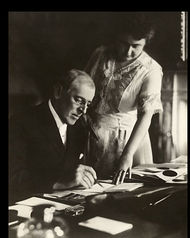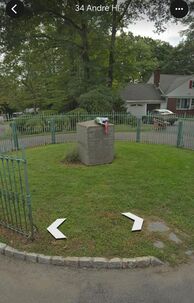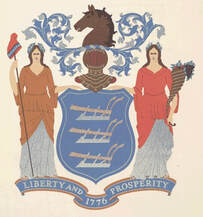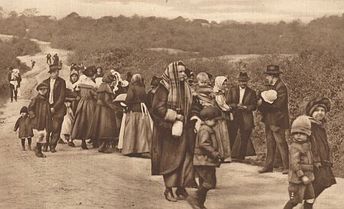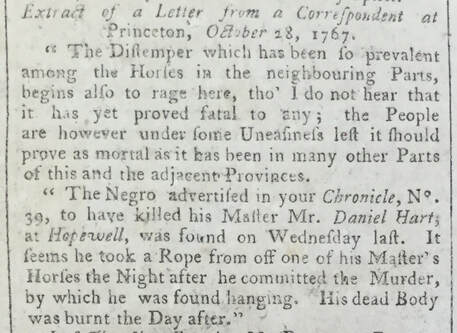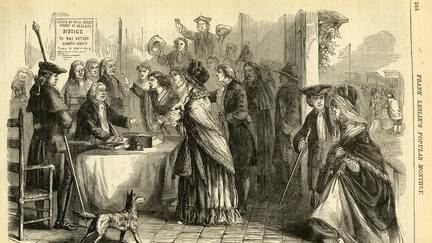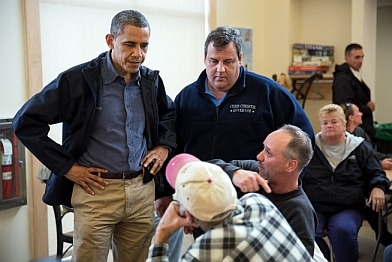* Home
|
-- New Jersey History Timeline - October
|
On October 10 of 1799
President John Adams arrives in Trenton to join his Cabinet, which had relocated from Philadelphia in August after the outbreak of Yellow Fever in that city. On the next day, the President is welcomed with a display of fireworks. By the middle of November, it was considered safe to return to Philadelphia and the offices were removed there.
President John Adams arrives in Trenton to join his Cabinet, which had relocated from Philadelphia in August after the outbreak of Yellow Fever in that city. On the next day, the President is welcomed with a display of fireworks. By the middle of November, it was considered safe to return to Philadelphia and the offices were removed there.
On October 10 of 1918
During the spread of influenza in the Pandemic of 1918, which had seen its first New Jersey death at Camp Dix in the prior month, Newark officials order all schools and businesses to shut, leading to a period when "departments stores were deserted, meetings of fraternal and benevolent organizations were cancelled, and social gatherings were postponed," according to a 1969 article in the Bulletin of the History of Medicine. In Hackensack, the mayor also ordered the closing of "all churches, theatres, moving picture houses, dance halls, pool rooms, lodge rooms, saloons, soda fountains and other places." In South River in Middlesex County, some 400 unmarked graves were determined in 2018 to be of those who died during the Pandemic.
During the spread of influenza in the Pandemic of 1918, which had seen its first New Jersey death at Camp Dix in the prior month, Newark officials order all schools and businesses to shut, leading to a period when "departments stores were deserted, meetings of fraternal and benevolent organizations were cancelled, and social gatherings were postponed," according to a 1969 article in the Bulletin of the History of Medicine. In Hackensack, the mayor also ordered the closing of "all churches, theatres, moving picture houses, dance halls, pool rooms, lodge rooms, saloons, soda fountains and other places." In South River in Middlesex County, some 400 unmarked graves were determined in 2018 to be of those who died during the Pandemic.
|
On October 10 of 1976 Giants Stadium opens in the Meadowlands with a National Football League game in which the Dallas Cowboys defeat the New York Giants by a score of 24 to 14 before a crowd of 76,042. |
|
On October 11 of 1811
Inventor and Revolutionary War Colonel John Stevens of Hoboken begins operating the first steam-powered ferry, the Juliana, between Manhattan and Hoboken
Inventor and Revolutionary War Colonel John Stevens of Hoboken begins operating the first steam-powered ferry, the Juliana, between Manhattan and Hoboken
|
On October 12 of 1920
Construction begins on the Hudson River Vehicular Tunnel, later named the Holland Tunnel in memory of its chief engineer Clifford Holland, connecting Jersey City with Lower Manhattan. It was opened on November 13, 1927. |
|
On October 12 of 1767
In Hopewell, a slave known as Cuff owned by wealthy farmer Daniel Hart “attacked his master with a knife and axe; with which he cut open his skull, and gave him many other wounds on his back and arms.” Hart died from his injuries. Cuff escaped capture, but hanged himself on a tree in the woods west of Princeton, in a location later known as “Cuffee’s Hollow.” Following an extensive search, local residents eventually discovered his body and burned it as a warning to others.
On October 13 of 1868
The faculty of the College of New Jersey approve a resolution permitting students to adopt and wear orange ribbons imprinted with the word “PRINCETON.” The color honors England’s Prince William III of Orange, for whom Nassau Hall on the campus is named. In 1874, William Libbey, Jr., a member of the Class of 1877, obtains 1,000 yards of orange and black ribbon for freshmen to wear as “Princeton’s colors.” They are officially adopted as the university's colors when the College of New Jersey is re-named “Princeton University” in 1896. On November 19, 1969, Apollo 12 astronaut Charles "Pete" Conrad, an alumnus in the Class of 1959, stepped onto the surface of the moon with a flag displaying the Princeton seal and colors, a flag which on his return he donated to the University Archives.
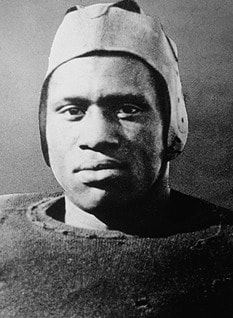
On October 14 of 1916
Rutgers sophomore tackle and guard Paul Robeson is excluded from the Rutgers football team when Washington and Lee University refused to play against a black player. Robeson later was named twice as a football All-American, and also became class valedictorian, a lawyer, and one of the best-known actors, singers and speakers, as well as provoking controversy over his advocacy of civil rights and socialist policies.
Rutgers sophomore tackle and guard Paul Robeson is excluded from the Rutgers football team when Washington and Lee University refused to play against a black player. Robeson later was named twice as a football All-American, and also became class valedictorian, a lawyer, and one of the best-known actors, singers and speakers, as well as provoking controversy over his advocacy of civil rights and socialist policies.
On October 15 of 1928
The German airship Graf Zeppelin completes its first trans-Atlantic flight, landing at Lakehurst
The German airship Graf Zeppelin completes its first trans-Atlantic flight, landing at Lakehurst
On October 16 of 1935
Governor Harold G. Hoffman secretly visits and interviews convicted Lindbergh baby kidnapper Bruno Richard Hauptmann in his cell at the Trenton State Prison. Hoffman had expressed doubts about Hauptmann's alleged role as the sole kidnapper, suggesting that others also should have been charged as accomplices, and also had criticized the quality of the evidence produced in the investigation headed by Colonel Herbert Norman Schwarzkopf, the first superintendent of the New Jersey State Police. After seeing Hauptmann, Hoffman granted a 30-day reprieve delaying the execution originally scheduled for January 17, 1936, but subsequently under intense pressure allowed the execution to proceed, which was carried out by electrocution at the Prison on the evening of April 3, 1936.
On October 17 of 1933
Fleeing from Nazi Germany, Albert Einstein and his wife arrive in Princeton, where he accepts appointment as a member of the faculty to continue his scientific research at the Institute of Advanced Study.
Fleeing from Nazi Germany, Albert Einstein and his wife arrive in Princeton, where he accepts appointment as a member of the faculty to continue his scientific research at the Institute of Advanced Study.
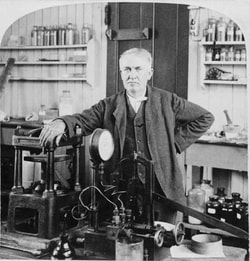
On October 18 of 1931
Thomas Alva Edison, one of the most prolific inventors in history awarded 1,093 patents during his lifetime, dies at his home in West Orange at the age of 84
Thomas Alva Edison, one of the most prolific inventors in history awarded 1,093 patents during his lifetime, dies at his home in West Orange at the age of 84
On October 19 of 1915
New Jersey voters in a statewide referendum reject amending the state Constitution to extend the right to vote to women by a vote of 184,390 to 133,282. New Jersey’s first constitution, hurriedly drafted and adopted in 1776, gave voting rights to 'all inhabitants of this colony, of full age, who are worth fifty pounds … and have resided within the county … for twelve months.' While some thought the 'all inhabitants' reference was inadvertent given the haste in drafting, in 1790 the legislature reworded the law to say 'he or she,' clarifying that both men and women had voting rights (although only single women could vote because married women could not own property). Still, many unmarried women voted in New Jersey in the 1790s and the first years of the 1800s, and women voters became targets of charges that they were easily influenced and were used to swing heavily contested elections. In 1807, the state legislature restricted suffrage (voting rights) to tax-paying, white male citizens. This was done to give the Democratic-Republican Party an advantage in the 1808 presidential election. Women often voted for the opposing Federalist Party, so taking away women’s voting rights helped the Democratic-Republicans. This law also took voting rights away from African Americans.
New Jersey voters in a statewide referendum reject amending the state Constitution to extend the right to vote to women by a vote of 184,390 to 133,282. New Jersey’s first constitution, hurriedly drafted and adopted in 1776, gave voting rights to 'all inhabitants of this colony, of full age, who are worth fifty pounds … and have resided within the county … for twelve months.' While some thought the 'all inhabitants' reference was inadvertent given the haste in drafting, in 1790 the legislature reworded the law to say 'he or she,' clarifying that both men and women had voting rights (although only single women could vote because married women could not own property). Still, many unmarried women voted in New Jersey in the 1790s and the first years of the 1800s, and women voters became targets of charges that they were easily influenced and were used to swing heavily contested elections. In 1807, the state legislature restricted suffrage (voting rights) to tax-paying, white male citizens. This was done to give the Democratic-Republican Party an advantage in the 1808 presidential election. Women often voted for the opposing Federalist Party, so taking away women’s voting rights helped the Democratic-Republicans. This law also took voting rights away from African Americans.
|
On October 20 of 1973
The "Saturday Night Massacre" takes place when during the Watergate scandal President Richard Nixon, after Attorney General Elliot Richardson had refused Nixon's demand to fire Special Prosecutor Archibald Cox, Richardson resigns, followed by his Deputy Attorney General William Ruckelshaus also resigning after refusing to fire Cox. Nixon then ordered the third-most-senior Justice Department official, Solicitor General Robert Bork, to fire Cox, who carries out the dismissal. The appointment of Cox, who was born in Plainfield in 1912, was made pursuant to a commitment by Richardson to Peter Rodino, chairman of the House Judiciary Committee and a veteran New Jersey Congressman, to appoint a special counsel to investigate the Watergate break-in. |
|
|
On October 21 of 1931
Thomas Edison funeral is held at his Glenmont estate and laboratory in West Orange attended by First Lady Lou Hoover, Henry Ford and Harvey Firestone, followed by burial in Rosedale Cemetery in East Orange. In the two days since Edison's death, some 40,000 people passed by his glass-topped casket in the library of his laboratory. President Hoover issues a proclamation calling for a national tribute to Edison's memory on the next evening by turning off electric lights for one minute. |
|
On October 21 of 2013
Same sex marriage becomes legally recognized in New Jersey when a trial court ruling takes effect in the case of Garden State Equality v. Dow invalidating the state's restriction of marriage to persons of different sexes and after the State Supreme Court denies a motion to stay the implementation of the lower court's decision.
Same sex marriage becomes legally recognized in New Jersey when a trial court ruling takes effect in the case of Garden State Equality v. Dow invalidating the state's restriction of marriage to persons of different sexes and after the State Supreme Court denies a motion to stay the implementation of the lower court's decision.
On October 22 of 1746
The College of New Jersey (renamed Princeton University in 1896) receives its charter from King George II, under the seal of John Hamilton, Acting Governor of the Royal Province of New Jersey. It is the fourth college to be established in the British colonies—after Harvard (1639), William and Mary (1693) and Yale (1701).
The College of New Jersey (renamed Princeton University in 1896) receives its charter from King George II, under the seal of John Hamilton, Acting Governor of the Royal Province of New Jersey. It is the fourth college to be established in the British colonies—after Harvard (1639), William and Mary (1693) and Yale (1701).
|
On October 22 of 1919 Elizabeth Ann Blaesing is born in Asbury Park, the illegitimate daughter of Nan Britton and US Senator and future President Warren G. Harding. At the time of the baby's birth, Harding is about to launch his successful 1920 presidential campaign to succeed Woodrow Wilson. Harding had secured living arrangements for his mistress at a house in Asbury Park after she had become pregnant during their affair. In August 2015, the paternity of Britton's baby by Harding is confirmed through DNA testing. |
|
|
On October 23 of 1935
The mobsters Dutch Schultz, Abe Landau, Otto Berman, and Bernard "Lulu" Rosencrantz are fatally shot at the Palace Chop House in Newark in what becomes known as The Chop House Massacre. The shooting was reportedly ordered by the national crime commission syndicate shortly after it had rejected Schultz's proposal to kill US Attorney Thomas Dewey in fear that Schultz would still go ahead with his plan to assassinate Dewey, thus provoking a major reaction by law enforcement against criminal leaders. |
|
On October 24 of 1931
After four years of construction, the George Washington Bridge is dedicated and opened to traffic on the following day. It was the longest main bridge span in the world at the time until being surpassed by the Golden Gate Bridge opened in 1937.
After four years of construction, the George Washington Bridge is dedicated and opened to traffic on the following day. It was the longest main bridge span in the world at the time until being surpassed by the Golden Gate Bridge opened in 1937.
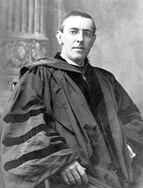
On October 25 of 1902
Woodrow Wilson is inaugurated as president of Princeton University. In his Inaugural Address, he declares: '...And in days quiet and troubled alike Princeton has stood for the nation's service, to produce men and patriots....' His remarks are later adapted for the University's unofficial motto, "Princeton in the nation's service."
Woodrow Wilson is inaugurated as president of Princeton University. In his Inaugural Address, he declares: '...And in days quiet and troubled alike Princeton has stood for the nation's service, to produce men and patriots....' His remarks are later adapted for the University's unofficial motto, "Princeton in the nation's service."
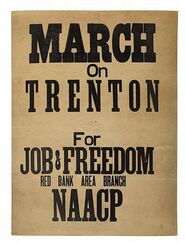
On October 26 of 1963
An estimated 4,000 people join in a civil rights “March on Trenton for Jobs and Freedom.” It is the first statewide civil rights demonstration in the US, having been modeled on the March on Washington the previous August 28.
An estimated 4,000 people join in a civil rights “March on Trenton for Jobs and Freedom.” It is the first statewide civil rights demonstration in the US, having been modeled on the March on Washington the previous August 28.
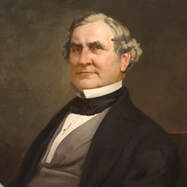
On October 27 of 1837
William Pennington, a member of the Whig party, is sworn in as the 13th governor of New Jersey and subsequently would be elected to seven successive single-year terms. He is later elected as a Republican to the US House of Representatives and serves as Speaker of the House during his single term from 1859 to 1861 as the nation heads to Civil War.
William Pennington, a member of the Whig party, is sworn in as the 13th governor of New Jersey and subsequently would be elected to seven successive single-year terms. He is later elected as a Republican to the US House of Representatives and serves as Speaker of the House during his single term from 1859 to 1861 as the nation heads to Civil War.
|
On October 28 of 1919
Congress passes the Volstead Act, overriding the veto of President Woodrow Wilson, providing for enforcement of the Eighteenth Amendment to the Constitution, which was ratified nine months earlier, prohibiting the “manufacture, sale, or transportation of intoxicating liquors.” New Jersey quickly became one of the leading states protesting Prohibition. In the 1919 gubernatorial campaign, State Senator Edwin Edwards was elected after he pledged in his "applejack campaign" to make New Jersey “as wet as the Atlantic.” Local officials in the state openly ignored attempts to ban the sale of alcohol, with some taking bribes from distributors and local taverns. Absecon Island became a primary point for bootleggers to offload whiskey shipped by boat from Canada, and Atlantic City grew rapidly under its political boss Nucky Johnson, who declared " We have whisky, wine, women, song and slot machines. I won't deny it and I won't apologize for it. If the majority of the people didn't want them they wouldn't be profitable and they would not exist. The fact that they do exist proves to me that the people want them." |
|
|
On October 29 of 2012
Hurricane Sandy makes landfall in New Jersey with gusts reaching 90 miles per hour and rain and storm surge flooding much of the state. Over two million households lose power, 346,000 homes are damaged or destroyed and the deaths of 37 people are attributed to the effects of the storm. |
|
|
|
On October 30 of 1938
The CBS radio broadcast 'War of the Worlds' produced by Orson Welles describing a Martian invasion of the town of 'Grovers Mills' in New Jersey (site in Township of West Windsor) is mistakenly believed by some listeners to be an actual news broadcast, sparking panic and calls to police. |
On October 31 of 2012
President Obama tours storm damage from Hurricane Sandy in New Jersey, with Governor Christie's warm welcome of the President just before the presidential election criticized by some Republicans as undermining voter support for Mitt Romney.
